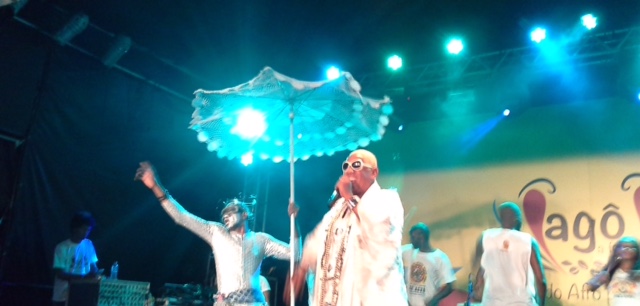Seduced by Salvador

Afro-Brazilian goddesses dressed in flowing white linen sway to Brazil’s most famous blocos—Bahia’s Afro-Brazilian samba schools. It’s been a long, hot day on Salvador’s inside track, meeting with capoeristas, musicians, and local artists to learn about Bahian culture. But this evening, I’m feeling reinvigorated by the cool offshore breeze coupled with a mélange of African drums.
On Friday evenings such as this one, locals pay tribute to Oxala, the orixa of the light of creation and consciousness, by wearing white. Oxala is one of several orixas, or African deities, celebrated by Bahians who practice Candomblé—a religion unique to the region that like many other aspects of this culture weaves together African and Roman Catholic beliefs.
I have often daydreamed of being Brazilian. Brazilians, after all, seem to be having more fun than the rest of us. Now I close my eyes and let the sounds of the Afro-Brazilian drums wash over me—and imagine that I am. There’s nothing left to do but dance with new friends in a sea of the most magnificent women I have ever seen as we all celebrate Black Consciousness Month in Salvador da Bahia. I can’t stop moving.
Earlier in the day, we breezed through Salvador’s neighborhoods, alleyways, galleries, markets, and favelas with our expert guide, Conor. With color and music dripping out of every corner of this city, it was easy to see how Conor had been seduced away from monotone London two decades ago. As he led us straight into the heart of the city, taking part in hands-on private demonstrations by capoeiristas and percussionists, Conor delicately reminded us that this isn’t a city for beginners. Contacts are currency here, and Conor knows the right people.
As we walked, Conor explained that Salvador, Bahia’s capital (and the first capital of Brazil) has always been a bewitching and tangled mess. Arguably Latin America’s most beautiful and interesting colonial city, it was built on the backs of slaves. The city’s original whipping post, located in the Pelhouriho, Salvador’s historic center, remains as a reminder of the city’s violent past.
Today it has a population of three million, with more residents of African descent than any other city outside of Africa. The Bahians’ strong sense of culture is expansive and encompasses religion (including Candomblé), dance and music, martial arts (such as capoeira), and cuisine. But along with being known as Latin America’s most jovial and musically inclined people, modern-day Bahians are equally plagued with a reputation for being perennially late and lax, which makes it a tricky place to do business, to know what time anyone will show up, and generally to understand what exactly is going on. Even the most established businesses lack reliable signage or maintain regular schedules.
Some things have changed, however. Due to improvements for the recent World Cup and an industrious young mayor, Salvador has cleaned up spectacularly. While any Bahian is quick to lament the challenges that remain, they are proud and ready to share their corner of Brazil. In fact, ask any Bahian what they love most about Brazil, and the instant ubiquitous response is always its people. So, it’s only natural that our favorite memories of Salvador include Bahians: The wonderful people who welcomed us into their homes and who taught us (or tried to teach us) to drum, sing, chat, kick, and spin were some of the kindest and most interesting people we have ever met.
But as much as I love Bahians, I realize as the drums swirl around me that I can never be one of them. I’m just not up to the all-night musical marathons that would require. The night seems to just be getting started, but we’re already exhausted, and we return to our hotel—a lovely colonial retreat in the heart of the Pelhouinho. While our room is silent, it’s hard to shake the beat, which has now made its way into my head. Equal parts exciting and grounding, the music of Salvador eventually lulls me to sleep.
# # # # #
To explore the bounties of Bahia with GeoEx, visit our Brazil destination page.

